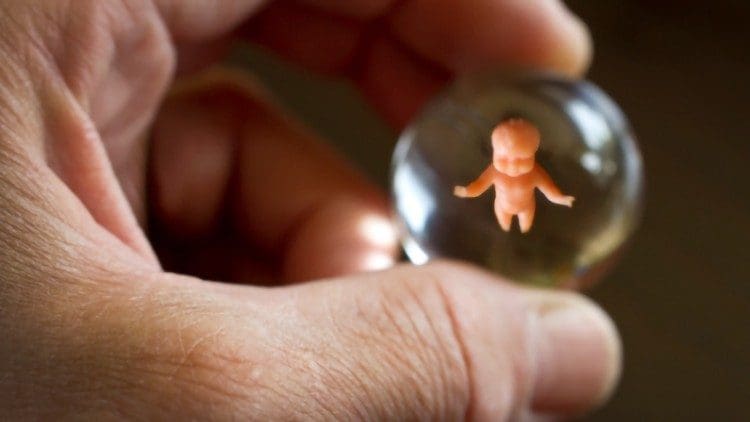On 12 September 2023, the European Parliament (EP), as reported by Hungary Today, in a vote of 483 to 52, adopted the report on new rules governing the use of so-called substances of human origin (SoHO) intended for human application, that would allow the classification of human embryos as ‘substances of human origin’.
Kinga Gál, Member of the EP for the Hungarian government Fidesz Party said she is ‘totally against the classification of human embryos as substances of human origin…. [T]he classification of the embryos as “human substance” is unacceptable. However, in view of the predominant liberal majority in the EP, the relevant parts of the draft text were adopted by the European Parliament.
Fidesz MEPs did not support the report in the final vote either.’
It is because a foetus is classified as ‘human substance’ and not a ‘human person’ why unborn babies are allowed to be terminated. In other words, if the foetus were to be legally recognized as a ‘human person’, his/her constitutional rights would have to be safeguarded, thus legally ending the procurement of abortion. Regrettably, foetuses do not have a separate legal personality from their mothers until they are born, at least until in recent years.
In Ireland in 2018 the Irish Supreme Court ruled that the foetus’ only inherent constitutionally protected right is the right to be born, overturning a High Court ruling that a foetus additionally possessed the children’s rights guaranteed by Article 42A of the Constitution. This is the first time in the West that foetal personhood was recognized under law.
The heart of the matter here are not late-term abortions, i.e., after the twentieth week of gestation, when it is more than obvious there is a human being in the mother’s womb. Rather, it is whether life begins from the moment of conception—by the sixth to eighth week the child’s heartbeat can already be detected. This movement, that of promoting foetal personhood has become a hot and controversial issue, and not just with left-wing politicians.
In the United States, for example, the Supreme Court on 11 October 2022 declined to decide whether foetuses are entitled to constitutional rights in light of its June ruling overturning the 1973 Roe v. Wade decision that had legalized abortion nationwide. And even former President, now candidate, Donald Trump not only declined to stake out a clear position in a recent Meet the Press interview on the whether a foetus should have a constitutional right to life, he went so far as to criticize legislation that protects the child in the womb in its early gestation:
‘I mean, [Florida Governor] DeSanctus [DeSantis] is willing to sign a five-week and six-week ban…. I think what he did is a terrible thing and a terrible mistake.’
When he was asked at point blank if a foetus should ‘have constitutional rights’ on various occasions, Trump responded:
‘I have exceptions, by the way. I think people should have exceptions. I think if it’s rape or incest or the life of the mother, I think you have to have exceptions. It’s very important.’
While Trump’s position, and he is not the only one, appears to be more of a political tactic to legally confront the procurement of abortions, as an Indiana lawmaker said, such would-be exceptions only ‘justifies the wicked, those murdering babies, and punishes the righteous, the pre-born human being’. In other words, regardless of how the child was conceived, why should he or she have to be killed?
In the State of In Georgia, a law granting fetal personhood to foetuses after six weeks of pregnancy took effect after the overturning of Roe v. Wade. Pro-Life groups, nevertheless, are petitioning Governor Brian Kemp to call a special legislative session to pass a foetal personhood amendment to the state constitution, which would eliminate any exceptions for abortion allowed in the law, by declaring a
‘paramount right to life of all human beings as persons at any stage of development from fertilization to natural death.’
I recall when I went to Borno State, Nigeria in the summer of 2019, I met a Nigerian woman who, along with her young child, had been kidnapped to Cameroon by Boko Haram terrorists. While in captivity, she was turned into a sexual slave, being raped multiple times by four different jihadists. She became pregnant, and because she was seen as unclean, was forced to deliver the baby herself. During an air raid on the camp, she was able to escape with both her child and the new-born baby, walking for about a month in the desert until she managed to get back to Nigeria—the older child died on the way. She told me that notwithstanding the trauma she underwent when raped and how the child, whom she named Chris, was conceived, she said: ‘It’s still my baby.’
The ‘pro-choice’ argument argues that a woman has a right to do with her body as she sees fit. In reality, she does not because there are laws that prohibit self-mutilation and suicide. And, even if the mother’s life is in danger, ending the child’s life in the womb in order to save hers is not a justification.
Last year US Justice Samuel Alito declared in the Supreme Court’s majority opinion in Dobbs v. Jackson Women’s Health Organization that Roe v. Wade was ‘egregiously wrong from the start’. The move to establish foetal personhood, i.e., to extend the legal rights of people to a foetus or embryo before viability could be the next frontier in the legal battle to defend the unborn, at least in the US.
Patrick Henry, the American politician and orator who declared to the Second Virginia Convention in 1775: ‘Give me liberty, or give me death!’, in his address to the Virginia Constitutional Convention on 14 June 1788 stated:
‘If you intend to reserve your inalienable rights, you must have the most express stipulation; for if implication be allowed, you are ousted of those rights. If the people do not think it necessary to reserve them, they will be supposed to be given up.’[1]
The predominance of human biological research attests that human life begins at conception, i.e., at fertilization. It is there that the human being emerges as a whole, genetically distinct, individuated zygotic living human organism, a member of the species Homo sapiens, needing only the proper environment in order to grow and develop. The difference between the individual in its adult stage and in its zygotic stage
is one of form, not nature.
This is attested by scientific evidence of when an individual human life begins, and is sustained by the American College of Pediatricians. They have made it known that scientific evidence ‘corroborates that a unique human life starts when the sperm and egg bind to each other in a process of fusion of their respective membranes and a single hybrid cell called a zygote, or one-cell embryo, is created.’
Would foetal personhood norms ultimately eliminate abortion? No, of course not. There are universal laws against murder, and yet murder is still committed! Yet human life would at least be recognized to begin at conception—this is already admitted by those who procure and consume the ‘morning after pill’; then perhaps there may be a change of heart in those who insist human embryos are ‘human substance’.
[1] Patrick Henry, “The Bill of Rights”, in The Constitution of the United States of America: And Selected Writings of the /founding Fathers, New York, Barnes & Noble, 2012, 722.
Related articles:








